A few years ago, my wife and I began feeding birds in our driveway, and that’s when we first noticed a pair of myna birds nesting across the street. These intelligent, bold creatures quickly became regulars, associating my car pulling in with a fresh supply of food. Myna bird care in the wild revealed itself through their clever behaviors, teaching me valuable lessons about their diet, social bonds, and health needs that apply even to pet owners.
What started as a simple routine turned into a daily ritual. The mynas would dash toward the car, waiting patiently until I scattered food. This sparked my interest in myna bird for sale options for those wanting to bring these charismatic birds home, but our story unfolded with these wild ones.
First Encounters and Building Trust
Our myna duo lived in a cozy nook under the neighbor’s roof, venturing over to join sparrows and others at the feeder. After work, I’d offer cereal initially, but soon researched proper myna bird care. I named them Myna 1 and Myna 2, marveling at how they paired for life—a common trait in common mynas, strengthening their bond through allopreening and shared defense, as noted in avian behavior studies.
This trust grew remarkably. Myna 1 was especially bold, approaching me closely, unlike the typical wary nature of wild myna birds. Their routine brought joy, drawing more species to our yard.
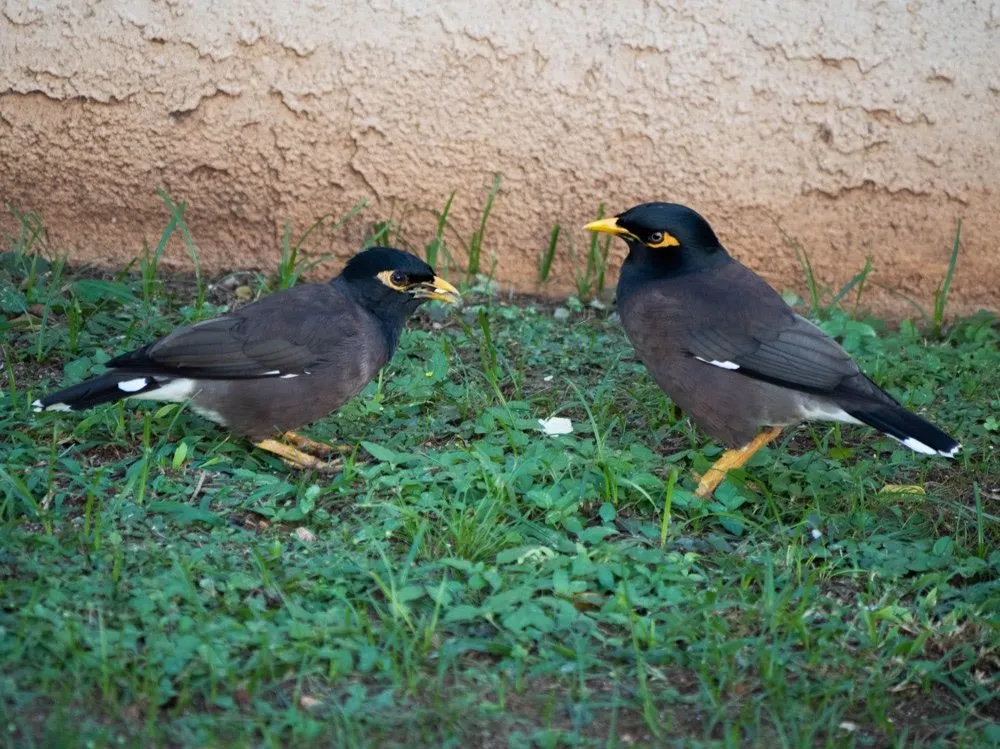 Myna 2 on the left and Handsome on the right
Myna 2 on the left and Handsome on the right
Key Aspects of Myna Bird Diet and Health
Researching deepened my understanding of myna bird care, especially hemochromatosis, or iron storage disease, prevalent in mynas. High-iron foods like fortified cereals can overload their systems, leading to liver damage. I switched to low-iron options: Pringles chips (negligible iron), wild bird seeds, and occasional mealworms—mirroring recommendations for pet mynas.
According to VCA Animal Hospitals, myna birds thrive on low-iron softbill pellets, fruits, vegetables, and insects, avoiding grains and vitamin C-rich foods that enhance iron absorption. Prevention is straightforward: monitor iron below 100 mg/kg in diet and use filtered water. These wild mynas flourished, but proper nutrition is crucial for longevity.
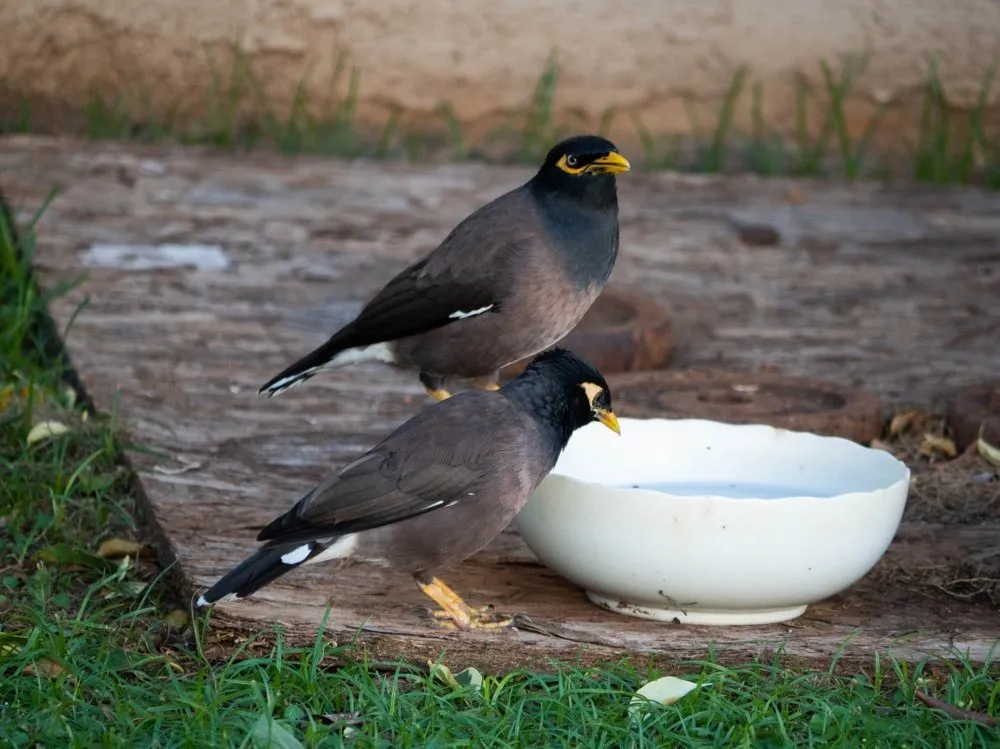 Myna 2 drinking water while Handsome guards the area
Myna 2 drinking water while Handsome guards the area
Their water intake was steady then, with a bird bath for bathing and drinking, supporting hygiene vital in myna bird care.
The Loss of Myna 1 and Survival Struggles
In 2016, tragedy struck when Myna 1 passed away. I found his body under a bush where he hunted bugs—a safe refuge. Mynas are fiercely territorial, competing aggressively for roosts by pecking and clawing in mid-air battles.
Myna 2 faced weeks of solitary defense against invading mynas, often hiding under our house to rest. Losing a lifelong mate was tough, yet she persevered, showcasing the resilience common in myna bird behavior.
A New Mate Arrives: Introducing Handsome
Relief came when a young, robust myna joined her—Handsome. Less trusting than Myna 1, he kept distance but learned lookout spots and territory defense under Myna 2’s guidance. He relished the reliable food, water, and baths.
Handsome’s caution is typical; wild myna birds prioritize self-preservation, fleeing humans before returning to eat.
Signs of Aging and Health Decline in Myna Birds
As years passed, Myna 2 grew more reliant, calling from the driveway when hearing us inside. She drank excessively— a potential sign of illness like kidney issues or diabetes in birds, per veterinary sources—and napped often in shaded spots.
These subtle changes, including lethargy and altered posture, align with early illness indicators in pet birds: increased thirst, excessive sleeping, and reduced activity.
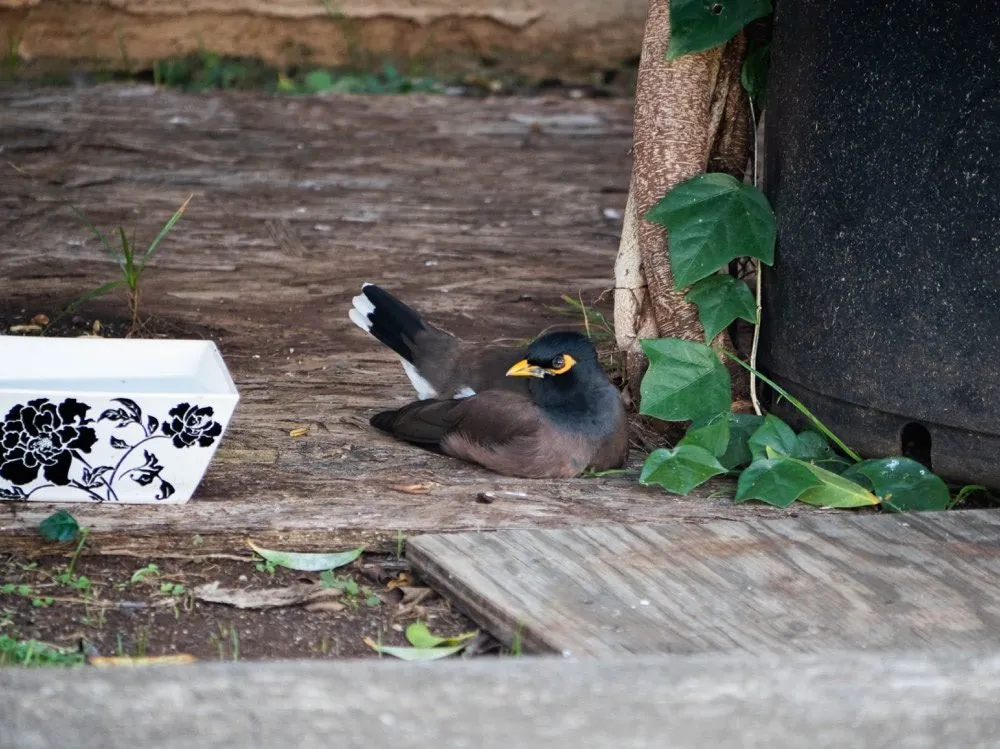 Myna 2 resting in a boat-shaped posture
Myna 2 resting in a boat-shaped posture Myna 2 appearing semi-sleeping near the water dish
Myna 2 appearing semi-sleeping near the water dish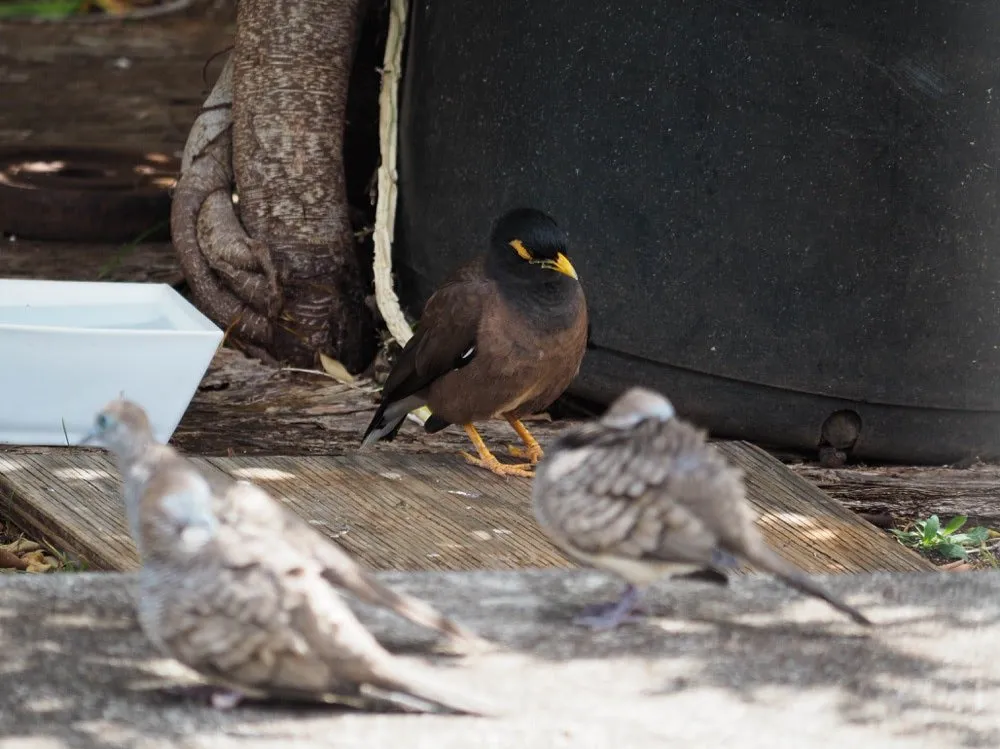 Myna 2 sleeping during the daytime
Myna 2 sleeping during the daytime
Observing from the kitchen, I’d see her doze amid other birds, a poignant reminder to watch for such cues in myna bird care.
Territorial Battles Intensify
Fledgling mynas invaded recently, sparking vicious fights. Handsome defended solo as Myna 2 watched from afar, her age slowing her. Despite skirmishes, they ended days unscathed, eating peacefully while he shooed doves.
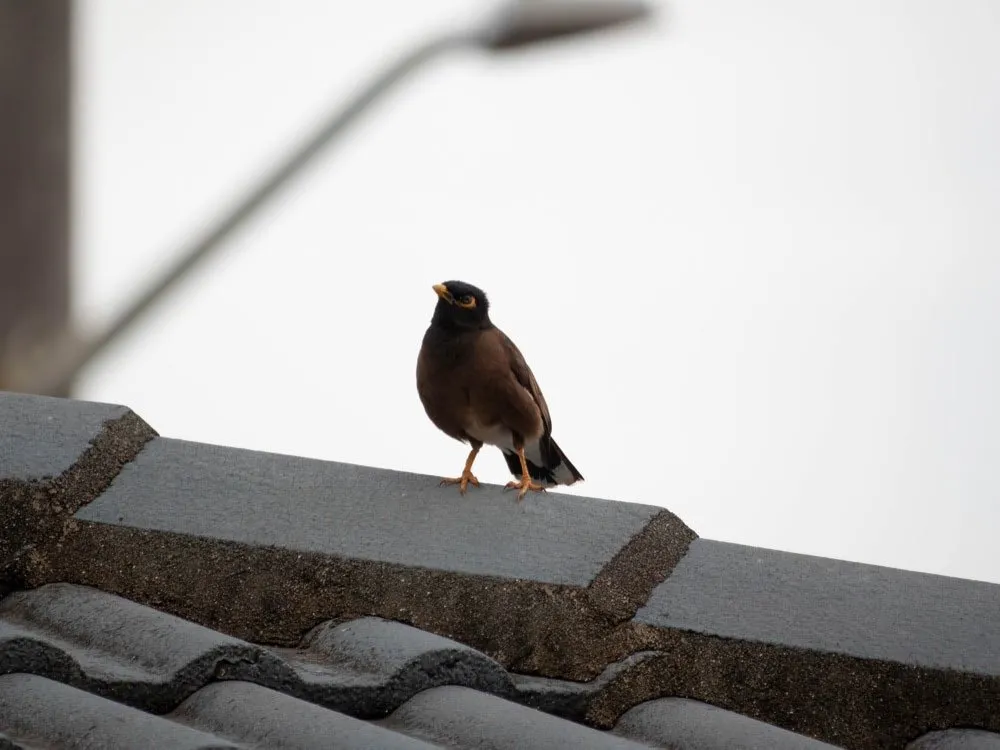 Handsome and Myna 2 foraging together after a confrontation
Handsome and Myna 2 foraging together after a confrontation
Myna bird territoriality underscores the need for ample space in captivity.
The Disappearance of Myna 2
Two weeks ago, Myna 2 vanished. Last seen Friday morning eating with Handsome, she didn’t return by dusk. We searched her haunts; Handsome called mournfully from poles into the night.
Her final photo captures them sharing chips—a testament to their bond.
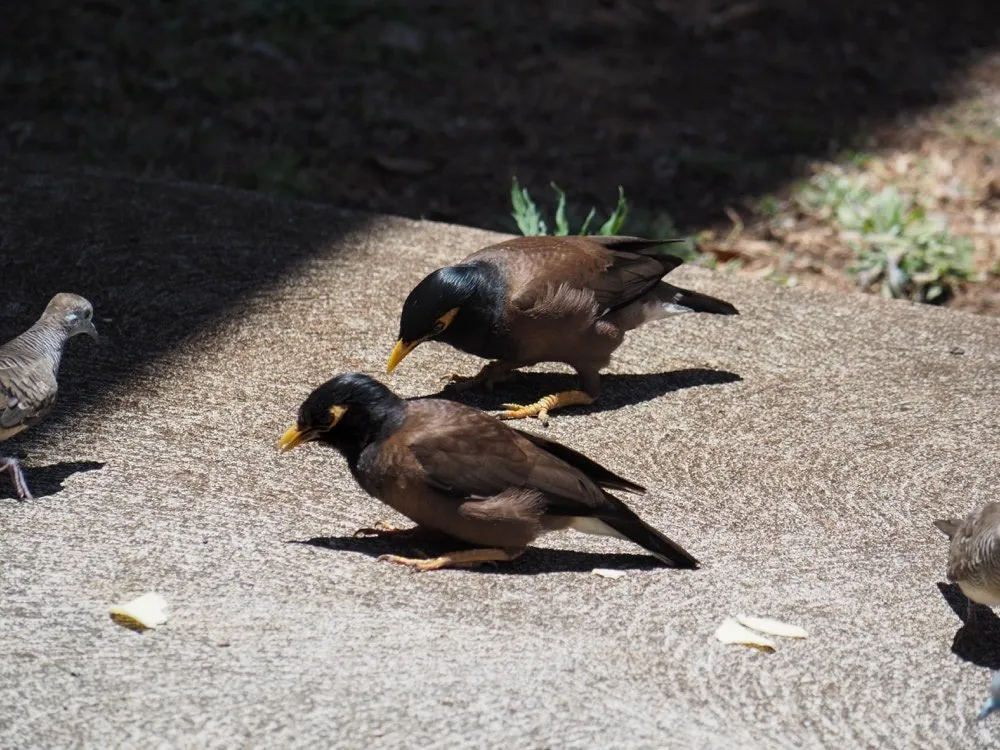 Last photo of Myna 2 in front and Handsome enjoying a snack of chips
Last photo of Myna 2 in front and Handsome enjoying a snack of chips
Reflections on Lifelong Myna Bird Companionship
This journey sparked my birdwatching passion, leading to gear upgrades and deeper wildlife appreciation. Myna 2 enriched my life through safe food, water, and shelter, though she remained wild—no petting, just mutual respect.
Her story highlights myna bird care essentials: low-iron diets to prevent hemochromatosis, respect for pair bonds, and vigilance for illness signs like polydipsia or lethargy. Common mynas’ monogamy and boldness make them rewarding to observe or keep.
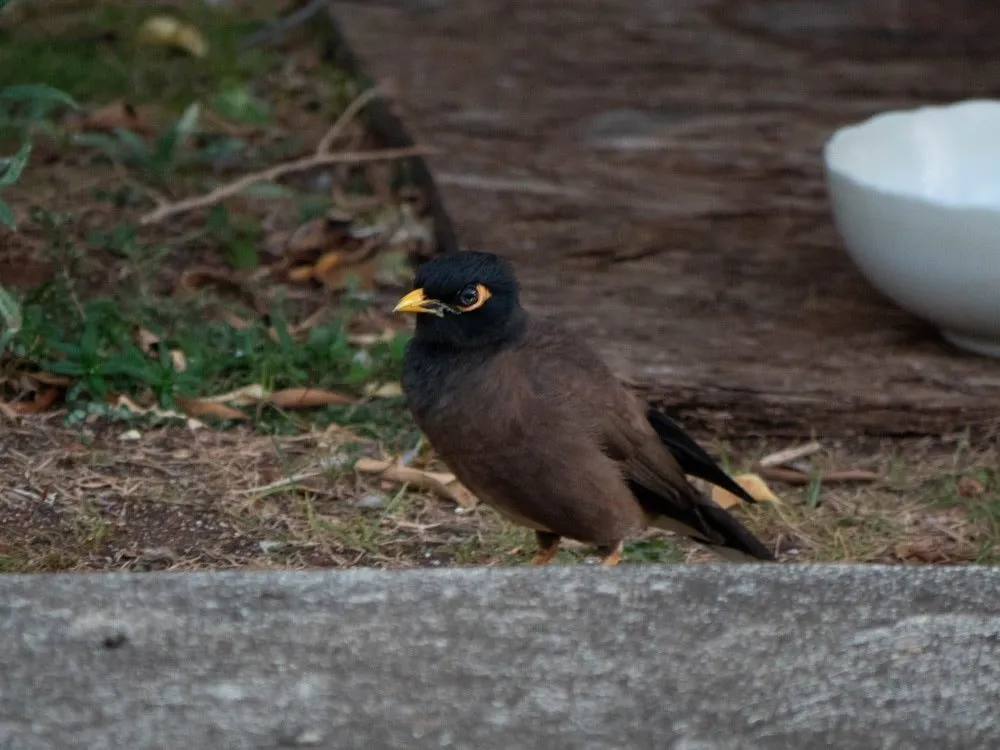 Memorable image of Myna 2, whose distinctive calls still echo
Memorable image of Myna 2, whose distinctive calls still echo
In appreciation of you, sweet Myna 2—your presence taught invaluable lessons.
Consult avian vets for pet mynas, and share your bird stories in the comments!
